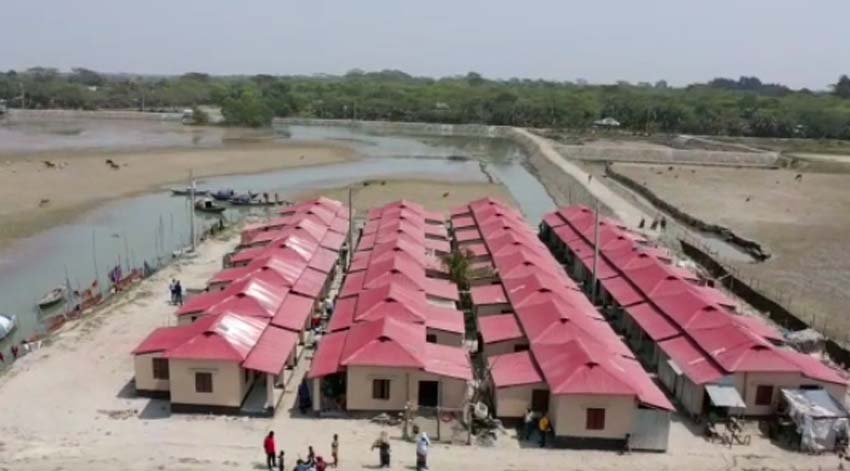
By Syed Altefat Hossain
RANGABALI, Patuakhali, Apr 06, 2022 (BSS) – The “Manta” community, whose life cycle centers around boat and livelihood on fishing, having no postal address now gets a permanent abode, thanks to the government's Ashrayan Prakalpa.
A small community that roams around in boats in the southwestern Patuakhali for over a century took it as their fate to live in boats from birth to death.
Despite their unusual way of life for ages, the community members were in growing need of permanent addresses to establish their constitutional rights, having a piece of land.
Bangabandhu’s birth centenary celebrations appeared to be an occasion to ensure their privilege as the government incorporated them in the nationwide campaign to provide address to landless people under the Ashrayan-2 Prakalpa.
Officials concerned said they enlisted the first group of “Manta” community to realize Father of the Nation Bangabandhu Sheikh Mujibur Rahman’s dream for a Bangladesh where everyone will have an abode of his own.
His daughter, incumbent Prime Minister Sheikh Hasina, launched the Ashrayan project to fulfill the Father of the Nation’s dream.
“The government initially rehabilitated 29 Manta families . . . first they were given the national ID (card) recognizing them as citizens and then they were given the houses built under the Ashrayan project,” Rangabali’s Upazila Nirbahi Officer (UNO) Md Mashfakur Rahman said.
Social and anthropological studies suggest the Mantas, Muslims by religion, were traditionally boat people but many of them were forced to adopt boat lives as victims of river erosion decades ago.
“I was born on a boat 70 years back since my grandfather was exposed to leading the floating life due to erosion,” septuagenarian Amir Ali Sardar said, adding he just knew his grandfather lost his home to the mighty river Kalaiya.
Sardar, one of the beneficiaries of the housing project, got married in a boat and his three children were born and grew up in the boat as well.
Emotion choked his voice as he recalled his life in a boat on the coastlines, when his family was exposed to frequent tidal surges and cyclones which also overturned the small craft several times.
“It is painful to live on a boat with family members, especially children. The children would fall in the river . . . many children drown unnoticed,” he said.
Sardar is now living in a concrete-made two-room house with tin-roof having a kitchen, a toilet and a veranda on two decimals of land, entirely under his legal possession.
The 29 Manta homes are also connected with electricity lines under a separate government campaign of bringing the whole country under 100 percent electrification coverage, marking the ‘Mujib Year’.
“We are grateful to our affectionate Prime Minister Sheikh Hasina for picking us up from the water. . . It was beyond my dream,” Sardar said.
Another “Manta community member, Kanchan Sardar, who is in his mid 70s, said they were treated largely as outcasts “even in mosques”.
Julekha Begum, 35, Pakhi Akter, 25, Minara Begum, 45, and Rokeya Begum, 35, who had been leading similar floating lives since their births have also been rehabilitated in the char land (shoal).
“My father, grandfather and I were born on boats. We were also married off on boats while my grandfather and father died on boats,” said Julekha Begum.
Since the Mantas have no graveyard for burying dead bodies, she said her grandfather and father were laid to eternal rest on others’ land and it was very much tough to manage the land.
Minara gave birth to her three children, two daughters and a son, on the boat.
She said it was very tough to foster children on boats since they were very much vulnerable to water and “we used to tie our children with ropes so they were not drowned”.
Prime Minister Sheikh Hasina handed over the houses to Amir and fellow recipients on June 20, 2021 through a ceremony on virtual medium, simultaneously providing them ownership documents of two decimals of land.
“Twenty nine families of the community got their home while houses are being constructed to rehabilitate 31 more families on the Char Mantaz under the third phase of the project,” the UNO said.
He added the government is also trying to create sustainable employment for them while by now they came under the coverage of electricity, sanitation and education.